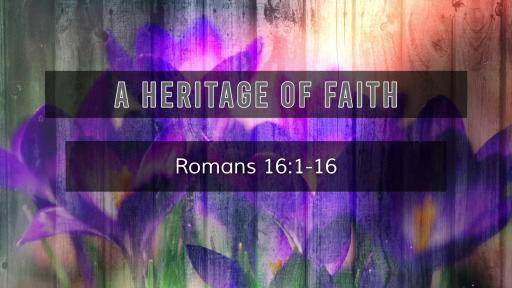Romans 16:1-16

Happy Mothers Day!! What is your heritage?
Message - A Heritage of Faith
‘I think’, wrote Chrysostom, ‘that many even of those who have the appearance of being extremely good men, hasten over this part of the epistle as superfluous … Yet’, he went on, ‘the gold founders’ people are careful even about the little fragments … it is possible even from bare names to find a great treasure.’ Brunner went further and called Romans 16 ‘one of the most instructive chapters of the New Testament’, because it encourages personal relationships of love in the church. Chrysostom and Brunner are right. Even in the genealogies of both the Old and the New Testaments, and in Paul’s list of those who send or receive greetings, there are truths to ponder and lessons to learn.
The last chapter of Romans is an important postscript. It includes the personal greetings that the apostle gives to the Christian community in Rome. I for one am very glad that this list of greetings is included in the text, because it reveals much about Paul’s personal relationships with people. And it reveals little insights about the kind of people that built the first century Christian church.
I commend to you our sister Phoebe, a servant of the church at Cenchreae, 2 that you may welcome her in the Lord in a way worthy of the saints, and help her in whatever she may need from you, for she has been a patron of many and of myself as well.
3 Greet Prisca and Aquila, my fellow workers in Christ Jesus, 4 who risked their necks for my life, to whom not only I give thanks but all the churches of the Gentiles give thanks as well. 5 Greet also the church in their house. Greet my beloved Epaenetus, who was the first convert to Christ in Asia. 6 Greet Mary, who has worked hard for you. 7 Greet Andronicus and Junia, my kinsmen and my fellow prisoners. They are well known to the apostles, and they were in Christ before me. 8 Greet Ampliatus, my beloved in the Lord. 9 Greet Urbanus, our fellow worker in Christ, and my beloved Stachys. 10 Greet Apelles, who is approved in Christ. Greet those who belong to the family of Aristobulus. 11 Greet my kinsman Herodion. Greet those in the Lord who belong to the family of Narcissus. 12 Greet those workers in the Lord, Tryphaena and Tryphosa. Greet the beloved Persis, who has worked hard in the Lord. 13 Greet Rufus, chosen in the Lord; also his mother, who has been a mother to me as well. 14 Greet Asyncritus, Phlegon, Hermes, Patrobas, Hermas, and the brothers who are with them. 15 Greet Philologus, Julia, Nereus and his sister, and Olympas, and all the saints who are with them. 16 Greet one another with a holy kiss. All the churches of Christ greet you.
‘I think’, wrote Chrysostom, ‘that many even of those who have the appearance of being extremely good men, hasten over this part of the epistle as superfluous … Yet’, he went on, ‘the gold founders’ people are careful even about the little fragments … it is possible even from bare names to find a great treasure.’ Brunner went further and called Romans 16 ‘one of the most instructive chapters of the New Testament’, because it encourages personal relationships of love in the church. Chrysostom and Brunner are right. Even in the genealogies of both the Old and the New Testaments, and in Paul’s list of those who send or receive greetings, there are truths to ponder and lessons to learn.
The last chapter of Romans is an important postscript. It includes the personal greetings that the apostle gives to the Christian community in Rome. I for one am very glad that this list of greetings is included in the text, because it reveals much about Paul’s personal relationships with people. And it reveals little insights about the kind of people that built the first century Christian church.
